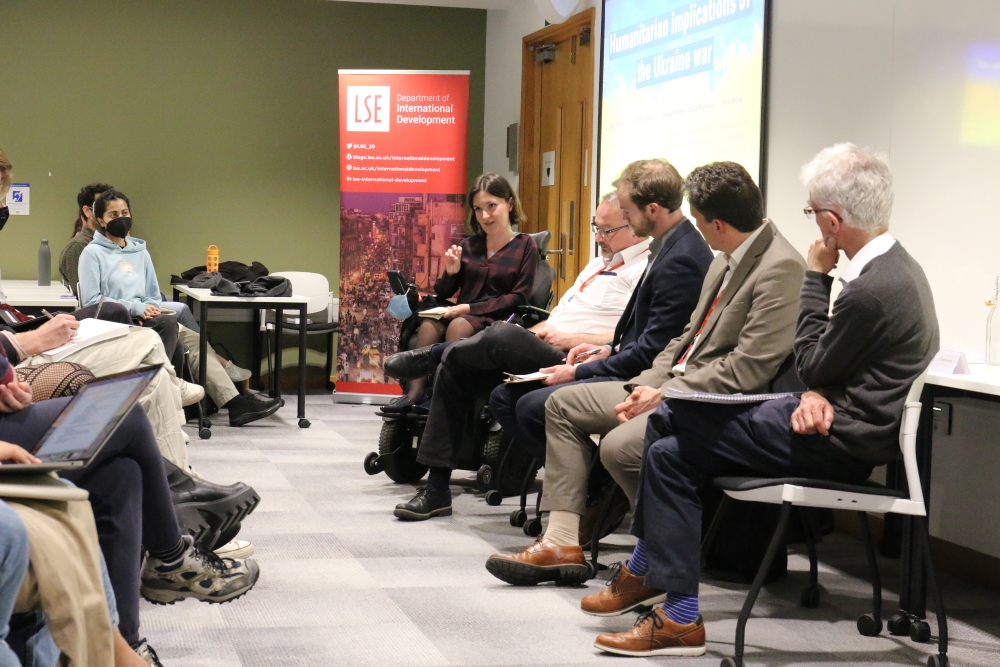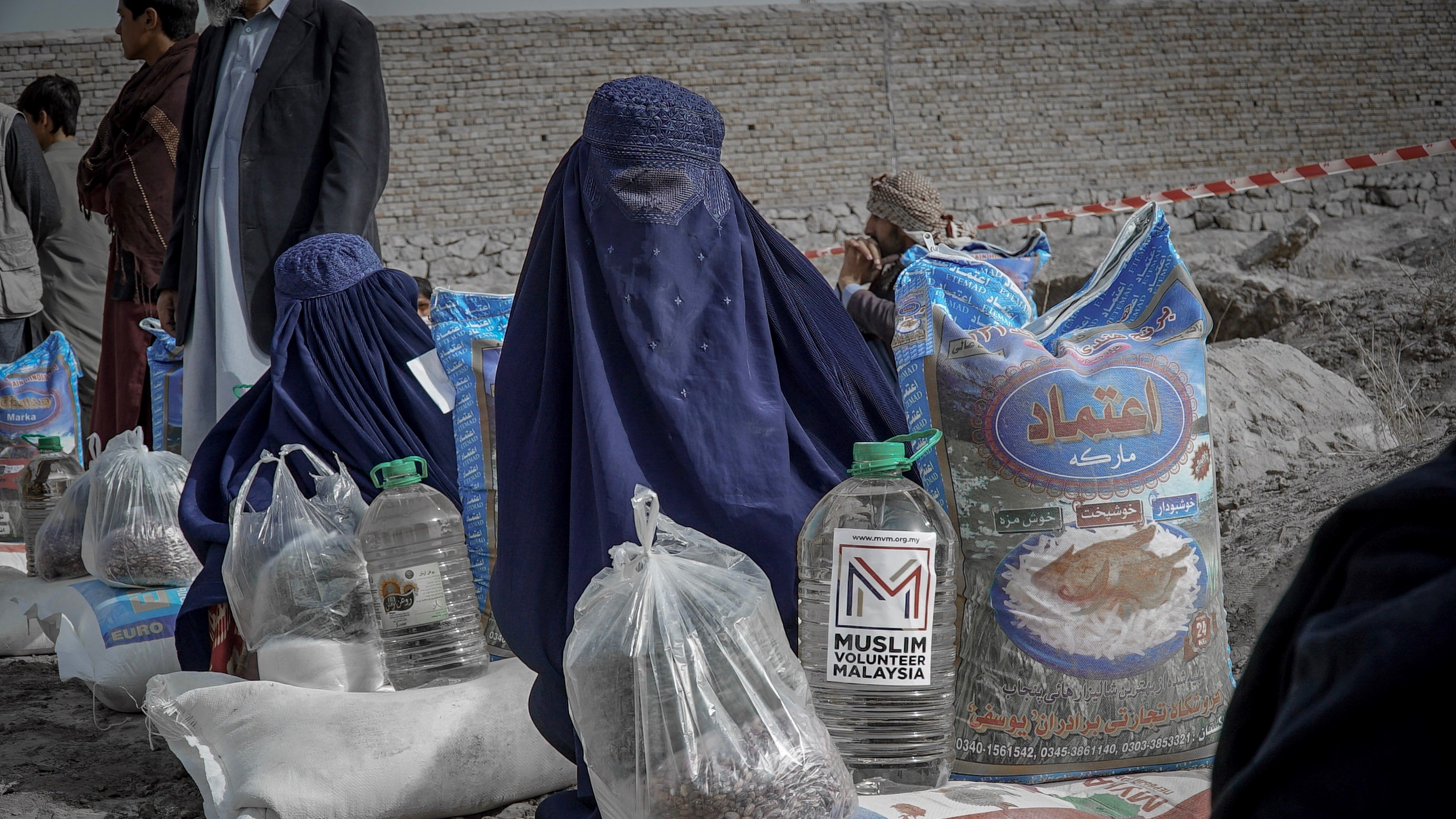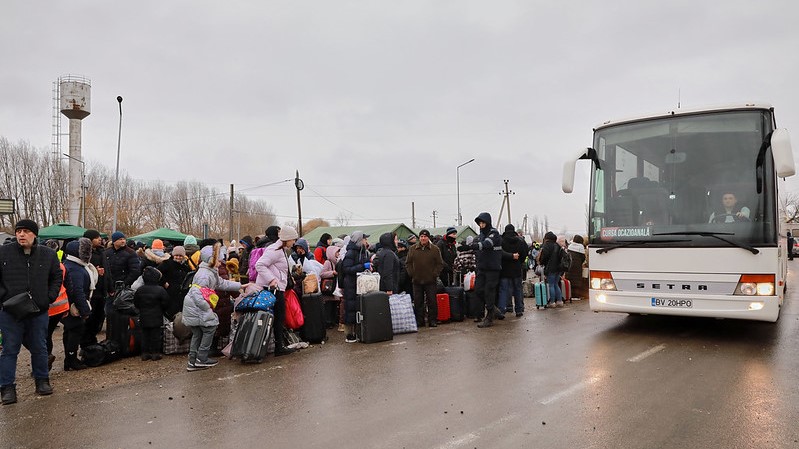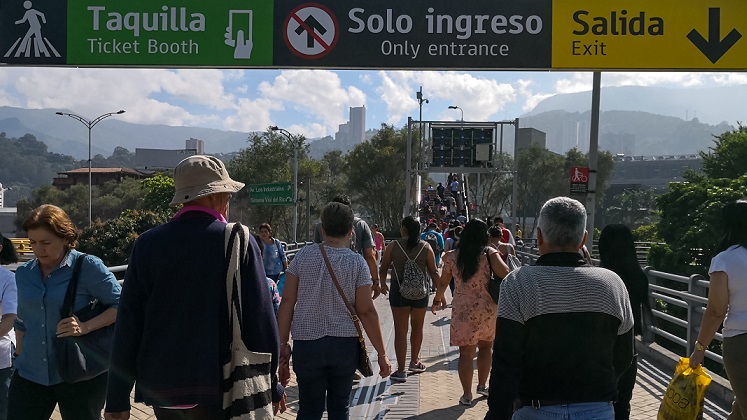MSc student in Development Studies Harkiran Bharij shares a reflection on a recent in-person panel event hosted by the Department of International Development on ‘Humanitarian implications of the Ukraine war’. You can also listen to an audio recording of the event as a podcast or on YouTube.
‘In this one month, Ukraine has developed into a humanitarian emergency of very significant proportions’, was a startling comment by Dr Ian Madison in his opening of the event. Chaired by Dr Madison (LSE Fellow and IDHE Programme Director), with a panel of 4 others – Sir Mark Lowcock (Head of UNDCHA), Dr Stuart Gordon (Co- Director of IDHE), Dr Eiko Thieleman (Professor in Political Science and Public Policy and finally, Anna Landre (IDHE student and disability activist) – this thought-provoking talk broadly captured the repercussions of the war on the civilians caught up in it. As the war in Ukraine continues to rage and claim more and more lives, it is now more important than ever to recognise what has failed in the past and what should be done to mitigate against the devastating humanitarian implications of this war.
As Dr Madison noted, the talk coincided with two very important anniversaries: the one-month anniversary of the Russia’s invasion of Ukraine and the 160th anniversary of the publication of A Memory of Solferino by Henry Dunant, often claimed to be the most important book within the contemporary humanitarian system. The Battle of Solferino, which the book is based on, was part of the ‘humanitarian big bang’ occurring in the late 19th century, and it depicts human concern for suffering driven by social, political, economic and military actions. Dr Madison highlighted the continuing relevance of A Memory of Solferino in contemporary contexts, including the Ukraine war and consequent suffering. Over the past month, concern has been growing around the plight of those caught up into the war, with posts circulating via social media documenting the violence or campaigns to sponsor vulnerable Ukrainian people. Over this last month 3.5 million people have fled the country, with 2 million being internally displaced. These numbers are projected to worsen, with 12 million people estimated to require assistance over the next three months.
Sir Mark Lowcock followed up with this with his view that there are three groups of people affected by the crisis in Ukraine. Firstly, and perhaps the most obvious group are refugees, making up the bulk of those that have had to flee. There has been great generosity within Eastern Europe (compared to the rest of the world, as emphasised by Sir Lowcock), with Ukrainian neighbouring countries stepping up to help and support refugees. For example, Poland has taken in 2.1 million refugees, while Romania, Moldova and Hungary have supported just over 1.2 million altogether. The second group of people are those that are internally displaced. Sir Lowcock estimates that this number will continue to grow as the conflict continues, even surpassing those internally displaced in Syria, placing a massive strain on the social order. The last group people are those caught up in the conflict and fighting, the most difficult set of people to support as they are in the middle of the struggle. Not only is it more difficult to provide them with humanitarian assistance, but the situation is also more extreme for them. Despite these groups being distinct, Sir Lowcock recognised that they should all be supported to alleviate as much suffering and save as many lives as possible.

Next, at the start of his section, Dr Stuart Gordon explored the varied meanings of the term ‘humanitarian space;’ a space where much action can take place, an operational environment adhering to humanitarian principles and a space for beneficiaries, and he claimed that the war has made it ‘contract.’ Dr Gordon outlined his take on Russia’s ideal scenario or ‘Plan A’ for the invasion: 3 or 4 days of military hostilities, limited Ukrainian resistance, actions riddled with self-interest (mostly Putin’s), the dissolution of NATO and the EU and finally, in celebration, a victory parade in Kyiv. Unfortunately, this plan failed due to a range of factors, including an underestimation of Ukrainian resistance, profound military incompetence, a breakdown of the logistics system, a failure of military leadership and the failure of the Russians to gain air superiority. Dr Gordon finished pessimistically, indicating that as Russia ploughs ahead with ‘Plan B’, there will be real worries that the war can escalate with cyberattack strategies and new technologies deployed by both sides, adding to the already high number of causalities.
Following Dr Gordon, Dr Eiko Thieleman discussed the Temporary Protection Directive, launched in 2001 and triggered for the first time since its implementation in the Ukraine crisis. Designed to provide immediate and temporary protection to displaced persons, the Directive provides a tool for the EU to address such situations. However, the distribution of refugees and those displaced is not a smooth process for two reasons. Firstly, there are capacity issues, with smaller countries attracting large numbers who they cannot care for. Secondly, there are concerns surrounding state willingness; due to the perception that distribution inflows are unfair, more states may be unwilling to contribute to protection efforts (something that we have already seen in European responses to the crisis), meaning that the vulnerable people caught up are not treated well enough.
Dr Thieleman proposed three options that European public policy in addressing these humanitarian repercussions, each with different pros and cons:
- Allocating responsibility to countries that have a meaningful link to the refugees
- A quota-based allocation methods
- A free-choice approach where refugees select their host country
Although there is a need to find a balance and implement new and improved public policies for refugees, putting them into practice and getting buy-in across EU member states may be more difficult. Dr Thieleman ended his section with a powerful statement- distribution issues will become tougher in Europe, and so solutions need to be found.
Lastly, and perhaps the most poignant part of the talk was Anne Landre’s discussion on the plight of the disabled persons caught up in the war. Of the 44 million people making up Ukraine’s population, 2.7 million have a registered disability though the real number of disabled citizens is likely to be as much as 15 to 20 % of the population. This demographic may be a minority, but it is one that needs the most support. Speaking of her own efforts working for Fight for Right, a Ukrainian organisation supporting those with disabilities, she emphasised that not enough is being done for this group by multilateral agencies such as the UN. There is a gap within the humanitarian space where the disabled are seen as ‘extra’ and thus there is a lack of expertise and knowledge surrounding this. In fact, it is the fault of the humanitarian system, she contended, which was not institutionalised with the disabled in mind, but rather those who are the easiest and most cost-efficient to assist. Organisations such as Fight for Right may be helping to overcome these gaps and draw attention to the issue, with those from the disabled community working as part of the organisation and the impact of highlighting their work and what needs to be done through social media.
Overall, the speakers not only highlighted the civilian implications of the Ukrainian war, but they emphasised the failures of the current humanitarian system. As the war rages on, Europe will be tested, in both its responses and the longer-term outcomes of these actions or inactions. There will also be consequences for countries far beyond Europe, especially developing countries. As Sir Lowcock mentioned, we are amid a global oil crisis, and there has been a huge increase in the cost of fertilisers, something which will directly affect food production and security and pose a huge challenge. Also, as highlighted by Anna, enormous work must be done to include marginalised groups such as the disabled in humanitarian responses and to build in the expertise which major policymakers and international organisations are currently lacking. Although the panel made clear that there is still much to do, there was a silver lining: the power of those at the bottom is stronger than ever. With grassroots organisations such as Fight for Right, social media and the will of the people, the outcomes of this crisis may be different to anything we have seen before.
The views expressed in this post are those of the author and in no way reflect those of the International Development LSE blog or the London School of Economics and Political Science.
All photos by Fabian Schmidt-Gödelitz.





